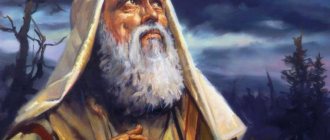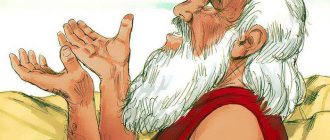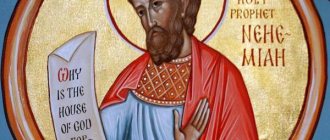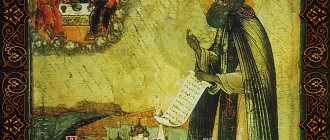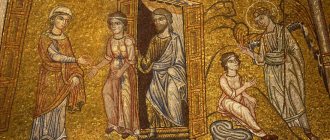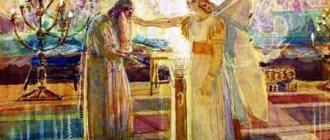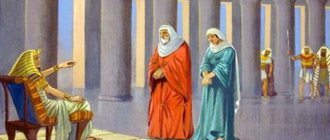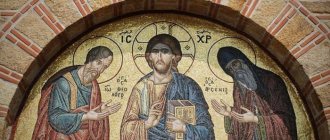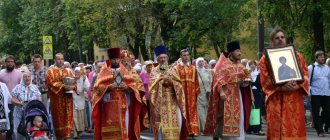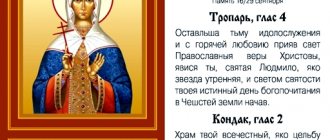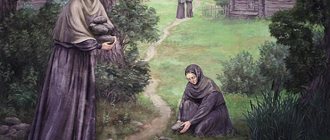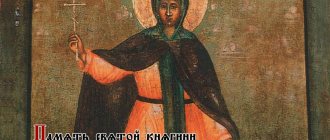Sacrifice of Isaac
Estimated reading time: 5 min.
This story is known perhaps more than all the other stories in the Old Testament: one day God demanded that the forefather Abraham sacrifice Isaac, his beloved son, whom God had promised him at one time and whom he had to wait for so long. Now God demanded that he be killed. And when Abraham had already raised a knife over his son, this sacrifice turned out to be unnecessary for God. What is this all for?
Some believe that this story, like a drop of water, highlights all the cruelty of ancient Jewish legends, which, fortunately, have nothing to do with us (as Leo Tolstoy believed, for example). Others, on the contrary, see something very important here - it is no coincidence that the story of the failed sacrifice of Isaac plays such an important role in both Christianity and Judaism. Christians generally believe that this is where the Old Testament came closest to the mystery that is revealed in the New Testament. But is there any sense in such commands? Doesn’t such a test look like a cruel mockery?
"Abraham sacrifices Isaac." Reitern E., 1849
Human sacrifice was widespread in ancient times. In order to receive something especially valuable and necessary from the gods, they had to give the most precious thing - and what could be more expensive than human life? Many pagans from time to time slaughtered captives or slaves on altars, and some (for example, the Incas in South America) sent to him noble and handsome young men who went to their deaths voluntarily, surrounded by honor. They died so that their people could live.
Finally, the most expensive sacrifice is one's own children, especially the first-born boys, who must inherit the father's name and title. The religion of the Canaanites and other peoples who inhabited Palestine before the Israelites considered such actions very commendable (this relates to the question of what sins God subsequently doomed these peoples to complete destruction for).
However, the Bible also tells about one episode when such a sacrifice was made by an Israeli. Much later, the judge (i.e., ruler) Jephthah, in gratitude for the victory granted by God, inadvertently promised to sacrifice to Him the first animal that came out of the gates of his house. The joyful daughter ran out first... Jephthah fulfilled his vow, although, perhaps, he could not have done this. Alas, there have always been people everywhere who were too zealous in fulfilling their religious obligations, even if it cost the lives of someone around them.
But let's get back to our story. Isaac was not just a long-awaited son - the Lord himself promised him to the childless Abraham and Sarah, and said that from him would come great offspring, the chosen people. The couple waited patiently for this promise to come true - and it came true only when this couple no longer had any hope of procreation, they were too old to give birth to children. Yes, God needed to test their faithfulness, to show them that everything believers in this world receive from Him, often contrary to their own calculations and common sense. But was Abraham not faithful enough? Didn’t Sarah learn everything during their travels?
And why, finally, was it necessary to subject Abraham’s trust to another, most terrible test... God turned to Abraham with these words: “Take your son, your only son, whom you love, Isaac; and go to the land of Moriah and there offer him as a burnt offering on one of the mountains about which I will tell you.”
Abraham did not answer the Lord, and we can only guess about his feelings and thoughts. The Bible describes only his actions: “Abraham rose early in the morning, saddled his donkey, took with him two of his servants and Isaac his son; He chopped wood for the burnt offering, and got up and went to the place that God had told him about.” This journey lasted three long days. Finally, they approached the mountain, which only Abraham and Isaac were supposed to climb, but to return... Abraham told the servants that they would return together. Did he want to calm them down? Or did he really think that everything would work out somehow and that his son would survive? The author of the New Testament book of Hebrews, for example, believed that Abraham believed that after the sacrifice God would raise Isaac.
"Crucifixion" Durer A., 1497
The boy himself probably began to guess about something and asked his father: “Here is the fire and the wood, where is the lamb for the burnt offering?” Abraham answered: “God will provide for Himself a lamb for a burnt offering, my son.” No matter how the circumstances turned out, he was confident that God would come up with a good ending for this story. And so it happened. When the boy was already lying on the altar, and Abraham raised his hand with a knife over him, a voice came from heaven: “Abraham! Abraham! Do not raise your hand against the boy, for now I know that you fear God and have not withheld your son, your only son, for Me.”
The test was passed. Why was it needed, since the Omniscient God knew for sure that Abraham would withstand it? Yes, He knew - but Abraham did not know this yet. This means that he needed both this experience and this victory.
Why do we need it, or why did the ancient Jews or even their neighbors need it? The story of Abraham and Isaac explained why the Israelites categorically rejected human sacrifice. It is not that they were too pampered or did not value their God highly enough to give the lives of their loved ones to him. No, Abraham was ready to do this, but God Himself rejected the unnecessary sacrifice of an innocent child.
One can, of course, add that the story of Abraham and Isaac calls on every believer to be ready to sacrifice what is most dear to God and not to perceive even his only child as his personal property.
But you can find many other facets to this story. For example, she tells us that the path of faith consists of paradoxes, and cruel paradoxes if you approach them with earthly standards. You receive everything that is promised to you, and much more, but not at all in such an easy and convenient way as you would like and as you could do - precisely because
God needs you not just as you are now, but as the best, strongest, most faithful and most beautiful you can become.
In the place where Abraham once raised a knife over Isaac, over time the Temple will be built, and next to this place the Calvary sacrifice will be made - the strangest and most terrible paradox of biblical history, the greatest sacrifice that God made - this time - for the sake of salvation of people.
Esau and Jacob
Isaac had two sons: Esau and Jacob.
Esau was a skilled trapper (hunter) and often lived in the field; Jacob was meek and quiet, living in tents with his father and mother.
Isaac loved Esau more, who pleased him with food from his game, and Rebekah loved Jacob more.
Esau, as the eldest son, had the birthright, that is, the advantage over Jacob in blessing from his father.
But one day Esau returned from the field tired and hungry. At this time, Jacob was cooking himself some lentil stew.
And Esau said to him: “Give me something to eat.”
Jacob said: “Sell me your birthright,” because he really wanted the blessing given by God to Abraham to apply to him, and thereby zealously serve God.
Esau replied: “Behold, I am dying of hunger, what is this birthright to me?” With this answer, Esau showed his disdain for the blessing of God.
Jacob said, “Swear.”
Esau swore an oath and sold his birthright to Jacob for a pot of lentils.
When Isaac grew old and blind, then, feeling that his life was coming to an end, he wanted to bless Esau as his eldest son. But, thanks to a trick arranged by Rebekah, he blessed Jacob instead of Esau. Isaac soon learned his mistake, and despite this, he still confirmed his blessing for Jacob.
For this, Esau hated his brother and even wanted to kill him, so Jacob had to leave his family.
On the advice of his parents, he went to his mother’s homeland in Mesopotamia, in the land of Babylon, to her brother Laban, to live with him until Esau’s anger passed, and at the same time to marry one of Laban’s daughters.
Note
: See the Bible, in the book. "Genesis": ch.
23; 24; 25; 27
, 1-9.
Abraham in Judaism
In ancient Jewish written sources (mildrash), Abraham is the first of the people to realize that God is one and to reject paganism. He became the first preacher of monotheism and a fighter against idolatry. According to the mildrash version, the site of Isaac's supposed sacrifice was the Temple Mount in Jerusalem. King Solomon erected a temple (where the name of the mountain came from) on the site of the altar of burning his son.
Abraham is considered the author of the book Sefer Yetzirah, the primary source of Kabbalah, a religious movement in Judaism.
Abraham in the Islamic tradition
In Islam, Abraham is identical to the prophet and preacher of Allah, Ibrahim. The proof is provided by biographical coincidences set forth in the Koran and the Old Testament. Ibrahim was a Hanif. Hanifism prepared the way for the emergence and spread of Islam in the Arabian Peninsula.
Ibrahim's eldest son, Ismail, is considered the ancestor of the Arabs and the ancestor of Muhammad. The youngest, Ishak, is the ancestor of the Jewish tribe. The Tomb of Ibrahim is one of the most revered Muslim shrines, located in Hebron (Palestine).
"In the name of the Holy Spirit"
Part 1. Confrontation
“The sons in the womb of [Rebekah, Isaac's wife] began to beat... The Lord said to her: two tribes are in your womb, and two different nations will come from your womb; one people will become stronger than the other, and the greater will serve the lesser. The children grew up, and Esau became a man skilled in hunting, a man of the fields; but Jacob was a meek man, living in tents. Isaac loved Esau because his game was to his taste, and Rebekah loved Jacob. And Jacob cooked food; and Esau came from the field tired. And Esau said to Jacob, Give me something red to eat, this red thing, for I am tired. But Jacob said, Sell me your birthright now. Esau said: Behold, I am dying, what is this birthright to me? Jacob said: Swear to me now. He swore to him and sold his birthright to Jacob” (Gen. 25:22,23,27-33).
If at that moment these “empty words” about selling the birthright were worth nothing to Esau, then the Almighty appreciated the act of these two brothers. And no matter how much the father loved Esau, the daring hunter, the courageous first-born, no matter how much he put him above the meek, “domestic” Jacob, the plans of the Almighty clearly did not include such preferences for Isaac. The time of reckoning came quietly, like a thief; in the book of Genesis, chapter 27, the story is described of how, by inspiration from Above, the father of these two brothers was deceived; and Jacob received that primacy, which Esau so frivolously neglected.
In this story, the blindness of Isaac's father, who blessed Jacob, symbolically indicated that: “God is no respecter of persons, but in every nation whoever fears Him and does what is right is acceptable to Him. ... As in Hosea he says: I will call not my people my people, and not my beloved, beloved. And in the place where it was said to them, “You are not my people,” there they will be called sons of the living God” (Acts 10:34,35. Rom. 9:25,26).
Subsequently, the Edomite people descended from Esau were considered as wicked as their progenitor; all together, they bore the image of the wicked Israel according to the flesh, who was at enmity with Israel according to the Spirit (Rom. 9: 7-12. Galat. 4: 29.). Christ said to the Jews, the spiritual followers of Esau: “Then you will begin to say: we ate and drank before You, and You taught in our streets. But He will say: I tell you, I don’t know you, where you come from; Depart from Me, all workers of iniquity. There will be weeping and gnashing of teeth when you see Abraham, Isaac and Jacob and all the prophets in the Kingdom of God, and yourself being cast out. And they will come from the east and the west, and the north and the south, and will lie down in the kingdom of God. And behold, there are last which will be first, and there are first which will be last” (Luke 13:26-30).
Moral: the same thing, in the form of a collective image pointing to the wicked Jews, happened to the thief, Judas Iscariot. It was precisely because of his wicked nature that he then became a traitor, deprived of his apostleship-“firstborn” (see: John 12:6; 13:21,26,27. Acts 1:15-26.). The Apostle Paul wrote on this occasion: “lest there be [among you] any fornicator or wicked man, who, like Esau, gave up his birthright for one meal. For you know that after this he, desiring to inherit the blessing, was rejected; “I could not change [my father’s] thoughts, although I asked with tears” (Heb. 12:16,17. See: Matt. 27:3-5. 2 Thess. 2:10-12.).
Part 2. Jacob's Dream - meaning
“And [Jacob] saw in a dream: behold, a ladder stood on the earth, and its top touched the sky; and behold, the angels of God ascend and descend on it. And behold, the Lord stands on it and says: I am the Lord, the God of Abraham your father, and the God of Isaac. The land on which you lie will I give to you and to your descendants; and your descendants will be like the sand of the earth; and you will spread to the sea, and to the east, and to the north, and to the noonday; and in you and in your seed all families of the earth will be blessed” (Gen. 28:12-14).
—What is the significance of this stairway to heaven? How and when did this dream come true?
After about two thousand years, Christ will say to the disciples: “Truly I say to you, among those born of women there has not arisen a greater man than John the Baptist; but he who is least in the kingdom of heaven is greater than he. From the days of John the Baptist until now, the kingdom of heaven is taken by force, and those who use force take it. … From now on you will see heaven open and the angels of God ascending and descending on the Son of Man” (Matt. 11:11,12. John 1:51). These words once again remind us that the expression: “I am the God of Jacob” is common to the expression: “in the name of the Holy Spirit.” “From the days of John the Baptist,” thanks to the Sacrifice of Christ, being born of the Holy Spirit, a true priesthood was formed to the Heavenly Father, which must intercede for the rest of humanity; It was from this time that the path to Heaven was opened (Heb. 10:19,20. John 3:13.). Pay attention, friends, to the order set forth by the Apostle Paul: “As in Adam all die, so in Christ all will live, each in his own order: Christ the firstborn, then those who belong to Christ at His coming” (1 Cor. 15:22,23). And, further: “And what else can I say? I do not have enough time to tell about Gideon, about Barak, about Samson and Jephthah, about David, Samuel and (other) prophets. … And all these, which were testified to faith, did not receive what was promised, because God had provided something better for us, so that without us they would be made perfect” (Heb. 11:32,39,40). – What does the last expression above mean? — We can see the answer in the book of Revelation: “they [the fellow priests of Christ born of the Holy Spirit] came to life and reigned with Christ for a thousand years” (Rev. 20:4). And, further: “the rest of those who died did not live again until the thousand years were completed” (Rev. 20:5(a)). These “rest of the dead” are those prophets who “not without” these priests of Christ will achieve the Kingdom of God; so, for example, the prophet Daniel was told: “go to your end and you will rest, and you will rise to receive your lot at the end of days” (Dan. 12:13. See: John 5:24.).
Part 3. Rachel and Leah
In the 29th chapter of the book of Genesis, it is narrated that Jacob served for Rachel for seven years. However, having gotten married, it was only the next day after the wedding night that Jacob realized that instead of Rachel, he had been “substituted” for another: his older sister Leah. The father of this unloved newlywed explained it this way: “in our place they don’t do that, to give the younger one away before the older one; Finish this week, then we will give you that week for the service that you will serve with me for another seven years” (Gen. 29:26,27). After the next seven years, Jacob married Rachel.
Time will pass and the Almighty will say in his Law: “Do not take a wife with her sister, to make her a rival, so as to expose her nakedness in her presence during her lifetime” (Lev. 18:18). However, this story with Jacob’s wives carries a symbolic meaning: just as in the story with Esau and Jacob, Leah and Rachel (from the same related family as Sarah and Rebekah) fought in their own way for the “birthright” "from her husband Jacob.
Reading about the lives of the sons of Rachel (the younger wife and Jacob), we can also see a principle that can invariably be traced throughout biblical history: “the first will be last, and the last first” (Matt. 19:30; 20:16. Luke. 13:30). Moses wrote: “Israel loved Joseph more than all his sons, because he was the son of his old age, and he made him a coat of many colors. And Joseph saw a dream, and told his brothers: ... behold, we are binding sheaves in the middle of the field; and behold, my sheaf rose up and stood upright; and behold, your sheaves stood round and bowed down to my sheaf. And his brothers said to him, “Will you really reign over us?” will you really rule over us? And they hated him even more for his dreams and for his words” (see: Gen. 37:3-10). The further story is about Rachel's son Joseph; we see him as a prophetic image of the Son of Christ. So Joseph was betrayed to the pagans for twenty pieces of silver by his own brothers, at thirty years old he appeared before Pharaoh to intercede for the people, feeding them with bread. “And Pharaoh said to Joseph: You will be over my house, and all my people will keep your word; Only with the throne will I be greater than you. And Pharaoh took his ring from his hand and put it on Joseph's hand; He dressed him in fine linen, and put a golden chain around his neck; ordered to take him to the second of his chariots and proclaim before him: bow down! And he set him over all the land of Egypt” (See: Gen. 41:37-46).
Another surprising thing is this: instead of Joseph allegedly “torn to pieces by a beast” (compare: Dan.7:7,19-21,26. Dan.11:22.) – Benjamin (also: son of Rachel) should have taken his place. This detail also has its own symbolic meaning; For reflection on this topic, we offer you passages of Scripture in logical order: 1 Kings 12:20. 2 Chronicles 11:12. (Col.2:17.) John 10:16. Luke 13:29,30. Rom.11:1,13. Phil.3:5. 1 Timothy 2:7. Eph.2:11-14.
— Reading the above texts, we see: the Apostle Paul, from the family of Benjamin, was the spiritual “father” (1 Cor. 4:15.) of the pagans - called to the Kingdom of the “Benjamites”, “lesser brothers” of the deceased and resurrected Firstborn “Joseph”-Christ . “There is no longer Jew or Gentile. … If you are Christ’s, then you are Abraham’s seed and heirs according to the promise” (Gal. 3:28,29). “Therefore, this is what the Lord, who redeemed Abraham, says about the house of Jacob: Then Jacob will not be ashamed, and his face will no longer turn pale. his children among himself , then they will holyly honor my name and holyly honor the Holy One of Jacob, and revere the God of Israel. Then those who wander in spirit will learn wisdom, and those who are disobedient will learn obedience” (Is. 29:22-24. See: Jer. 31:15-17. Eze. 36:25-27.).
Part 4. The Twelve Sons of Jacob
When the “Eternal Father” (Isaiah 9:6), the greater “Isaac,” was asked: “Are you greater than our father Jacob, who gave us this well and drank from it, and his children and his cattle?” (John 4:12) - Christ will say: “The water that I will give him will become in him a fountain of water springing up into eternal life.” “These things He said concerning the Spirit, which those who believed on Him were about to receive: for the Holy Spirit was not yet given to them, because Jesus was not yet glorified. …And they all drank the same spiritual drink: for they drank from the spiritual stone that followed; and the stone was Christ” (John 4:14; 7:37-39. 1 Cor. 10:4).
Soon, the twelve apostles of Christ, born of the greater “James” - the Holy Spirit, themselves appeared as a kind of “streams of living water”, “ patriarchs ”, through whom spiritual Israel multiplied (see: Ex. 15:27. Acts 8:18; 9:31). On the night before His death, the Lord said to these sons of the Spirit: “You who have followed Me, in the end of life, when the Son of Man sits on the throne of His glory, you also will sit on twelve thrones, judging the twelve tribes of Israel” (Matt. 19:28. See : Rev. 21:1,9,10,14.).
